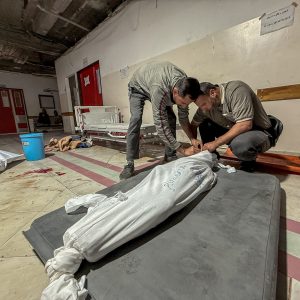From mosque to Indian parliament: Mohibullah’s dual role as Imam and lawmaker
Nadvi, sworn in as a newly elected MP, says he will continue to lead prayers in the mosque located across the Indian Parliament building
By Iftikhar Gilani
NEW DELHI, India (MNTV) – It took Maulana Mohibullah Nadvi almost 20 years to cross the road that separates the mosque where he leads prayers from the Indian Parliament building.
In the heart of India’s capital New Delhi, just a stone’s throw away from the grandeur of the Indian Parliament, stands the Jama Masjid of New Delhi on Parliament Street.
Unlike its majestic counterpart in the old city, this modest, white-painted mosque may not catch the eye, but its significance is deeply felt. For decades, it has been a spiritual sanctuary for Muslim leaders during parliamentary sessions, their prayers echoing beneath its unassuming dome. Its imam also unlike the Shahi (Royal) Imam of Jama Masjid of Old Delhi is not known for political ambitions.
Maulana Mohibullah Nadvi, who leads the prayers in the mosque, has bridged these two worlds on a decades-long journey. For years, he has led the prayers within the quiet walls of the mosque, a daily ritual where some of India’s most influential Muslim personalities come and go.
But Monday marked a pivotal moment not only in his life, but also in the history of the mosque itself.
As the Zuhur prayer began in the afternoon, there was speculation among the worshippers as to whether Imam Nadvi, who had earlier left Parliament to be sworn in as a newly elected MP, would ever return to his spiritual duties.
The anticipation was palpable. However, to their collective relief and surprise, the 48-year-old Nadvi reappeared shortly afterwards and crossed the road that for years had only symbolized physical distance.
Standing in front of his congregation, Nadvi made a heartfelt announcement: He would continue to lead the prayers five times a day, despite his new duties as a member of parliament.
This decision underlines his deep commitment to his faith and his community and reaffirms his dual role as a spiritual leader and political figure.
Nadvi’s journey from the mosque to the corridors of power illustrates a unique story of faith combined with political engagement that resonated deeply within the walls where his political aspirations first took root.
Mohibullah’s journey into politics began within the quiet walls of the mosque, where his role as imam brought him into contact with numerous politicians and influential figures.
Those who have prayed behind him include the late Dr. APJ Abdul Kalam, former president of India, Hamid Ansari, vice president of India and many others.
These encounters sparked his interest in politics and made him dream of crossing the road between the mosque and the Parliament. He also lived with his family in a two-room hut inside the mosque.
But that was a difficult undertaking. He had already tried his luck a few times asking politicians to put him up for the provincial elections. But no one took him seriously.
Speaking to Muslim Network TV from New Delhi, Nadvi said the late Shafiqur Rahman Barq, a former MP, had introduced him to Akhilesh Yadav, the leader of the Samajwadi Party, a regional party that dominates India’s largest province, Uttar Pradesh.
As the party’s strongman and MP from Rampur, Azam Khan, was facing legal challenges, Yadav wanted another Muslim face for the Muslim-dominated Rampur seat.
Despite opposition from within the party, Mohibullah secured the nomination for the Rampur seat, a decision that was vindicated by his victory over incumbent Hindu nationalist BJP MP Ghanshyam Lodhi by a sizeable margin of 87,000 votes.
Mohibullah’s academic background is as profound as his spiritual path.
He was born in the village of Razanagar in the Suar region of Rampur and studied Islamic studies intensively.
After studying at the Madrasa Jameul Uloom Furqania and Darul Uloom Nadwatul Ulama in Lucknow, he moved to Delhi where he obtained a degree in Arabic and a Masters in Islamic Studies from Jamia Millia Islamia. He was appointed Imam of the Parliament Street Mosque on March 28, 2005 by Delhi Wakf Board.
Situated in the eastern city of Lucknow, Nadwatul Ulama is a premier Islamic seminary, which has produced world famous Islamic scholars like Abul Hasan Ali Hasani Nadwi, also known as Ali Miyan.
Credits: Sansad (Parliament) TV, showing Nadvi taking oath in the parliament
-Dual role
As a newly elected MP, Mohibullah now plans to use his dual role to improve the lives of his constituents and continue to lead prayers.
He has placed an emphasis on unemployment, healthcare and education and has expressed his willingness to negotiate with state and central agencies to bring resources to Rampur.
Navigating between the spiritual and the political, Mohibullah says he will continue to devote himself to his duties as an imam, emphasizing that he only has to spend five to six minutes leading prayers.
The mosque’s proximity to parliament, a short walk of about 50 meters, effectively supports his dual responsibilities.
He said he will spend a few days each week in his constituency. After attending the parliamentary session and leading the afternoon prayers on his first day, he is confident that he will be able to combine these duties seamlessly.
The mosque is believed to have been built during the Mughal period at the foot of the Raisina Hills, which the British later made the seat of their power. It was renovated in 1946 by the Bharat Chemical Works of Calcutta.
Since there is no population in the area, except those who work in government offices, there is no one to look after the mosque. It had started crumbling at various places. Its roof had collapsed, and its walls and gates were in dire need of repair until a few years ago when M. A. Yousuf Ali, a businessman from Kerala, visited the mosque and noticed its dilapidated condition.
On his return, he asked his office to prioritize the renovation of the mosque as it is located near the parliament and is frequented by many visitors.
India’s first education minister and freedom fighter Maulana Abul Kalam Azad used to pray regularly in this mosque, as did all former presidents Zakir Husain and Fakhruddin Ali Ahmad, especially on Fridays.
As it is located almost in the center of New Delhi, most visiting heads of state and delegations from Islamic countries offer prayers in this mosque.
As many as 24 Muslim MPs have made it to India’s Lok Sabha, the lower house of parliament, in the recently concluded general elections, against 26 in the previous house.
Muslims are the largest minority in India and have a population of 183 million, 14% of 1.4 billion people. But their share in parliament has remained below 5%.












